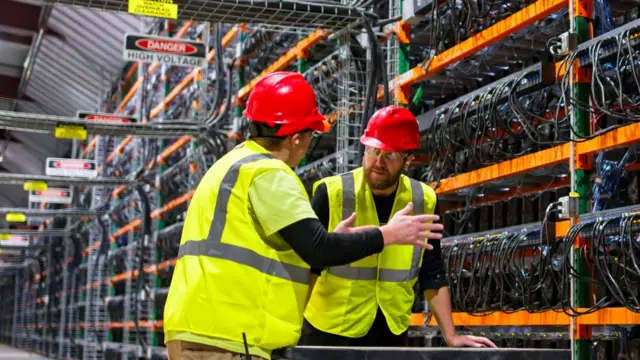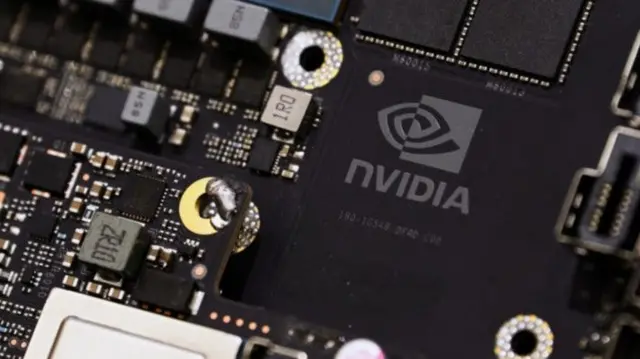Tech trends for 2025: Cryptocurrency and personalized AI

BBC Business Technology Editor Ben Morris and BBC Technology Editor Zoe Kleinman discuss the top trends for the year ahead.
Ben Morris, BBC Business Technology Editor
As 2022 draws to a close, the outlook for the cryptocurrency industry looks bleak.
One of the most high-profile firms, FTX, collapsed, leaving $8 billion (£6.3 billion) of customer funds missing.
In March 2024, the company's co-founder, Sam Bankman-Fried, was sentenced to 25 years in prison for defrauding clients and investors.
The scandal has shaken confidence in the industry.
At the time, cryptocurrency still seemed to be a niche product with a passionate but relatively limited group of supporters.
Yet, just a few months later, the industry is feeling a renewed sense of optimism, fueled by the election of Donald Trump in the United States on November 5.
It is widely believed that Trump will be friendlier to the cryptocurrency industry, and current signs suggest that this view is correct.
In early December, Trump announced that he would nominate former U.S. Securities and Exchange Commission (SEC) commissioner Paul Atkins as chairman of the agency.
Atkins is seen as more supportive of cryptocurrencies than outgoing chairman Gary Gensler.
The news sent the price of Bitcoin soaring to over $100,000.
"With Trump's election, you can imagine positive regulatory policy emerging in 2025. At the same time, some negative regulation may be removed, which will allow banks and other institutions to enter this space," said Geoffrey Kendrick, global head of digital asset research at Standard Chartered Bank.
Kendrick specifically mentioned a guidance document issued by the U.S. Securities and Exchange Commission, SAB 121 (Staff Accounting Bulletin 121), which makes it difficult for banks and other financial institutions to provide cryptocurrency services when it comes into effect in 2022.
If the rule is repealed, it could help Trump fulfill a promise he made in July to make the United States the world's cryptocurrency capital.
If he follows through on that promise, it would be a remarkable reversal since in 2021 Trump once described Bitcoin as a “scam.”

AI is getting more personal - Zoe Kleinman, BBC Technology Editor
As artificial intelligence (AI) tools become more integrated into our phones, with services from Apple, Google and Samsung all offering the ability to edit photos, translate languages and search the web, we’re at the beginning of an era where AI becomes an intrinsic part of our digital lives and becomes increasingly useful on a personal level.
However, all this requires a certain degree of trust and acceptance on our part.
Take schedule management as an example. AI tools can efficiently manage your schedule, but this requires you to allow it to access your schedule information. However, to what extent should it be open?
In order for it to be truly useful, does it need to know which people you wish to avoid seeing, or which relationships you wish to keep private, and from whom?
Would you like it to provide you with summaries of counseling sessions or medical appointments?
This is all very personal information that, if leaked through some vulnerability, could lead to very embarrassing or even serious consequences. Would you hand over this type of data to a big tech company?
Microsoft is making a big push into this area. In 2024, the company was embroiled in controversy when it demonstrated an AI tool called Recall that took snapshots of a laptop desktop every few seconds to help users locate content they had seen but no longer remembered.
Although the product was never officially launched, Microsoft stuck to its principles and made some changes to the tool.
"I think we're heading into a fundamentally new era where you have ubiquitous, persistent, and very effective partners in your daily life," Mustafa Suleyman, head of Microsoft's AI division, recently told the BBC.
Despite the challenges, Ben Wood, principal analyst at technology research firm CCS Insight, expects more personalized AI services to emerge in 2025.
“These services will continuously deliver up-to-date outputs by integrating ever-updating data sources such as emails, messages, documents and interactions on social media. This will enable AI services to be tailored specifically to an individual’s communication style, needs and preferences,” he said.
However, Wood acknowledged that giving AI access to your personal data would be a huge challenge.
"Trust is going to be key," Wood said.

The movement of data - Ben Morris, BBC Business Technology Editor
As more funds flow into the field of artificial intelligence (AI), the demand for data center construction will continue to increase.
Training and running AI requires massive amounts of computing power and the ability to work with the latest computer chips and servers.
The largest data users, including Google, Microsoft and Meta, could invest as much as $1 trillion in data centers over the next five years, according to CCS Insight.
In Europe alone, data center capacity is expected to grow by an average of 9% per year from 2024 to 2028, according to real estate services firm Savills.
However, these new facilities are unlikely to be built in current data center hubs such as London, Frankfurt and Amsterdam.
Savills noted that land prices in London, at up to £17 million per acre, and limited electricity supply, have forced developers to look elsewhere.
In the UK, cities like Cambridge, Manchester and Birmingham are likely to be home to the next wave of data center construction.
In Europe, cities such as Prague, Genoa, Munich, Düsseldorf and Milan are also expected to be considered.

At their core, some new data centers will be equipped with the latest computer chips from Nvidia, a company that dominates the market for chips for artificial intelligence.
The Blackwell chip, which will be released in March 2024, is expected to start mass shipments in 2025.
The new chip should enable tech companies to train AI four times faster and run it 30 times faster than current computer chips, according to Vivek Arya, senior semiconductor analyst at Bank of America Securities.
Nvidia's largest customers reportedly include Microsoft, Amazon, Meta and Coreweave, which may have priority access to the technology.
However, other customers may have trouble getting the superchip, Arya said, "supply will be limited in 2025."
Tech trends for 2025: Cryptocurrency and personalized AI

BBC Business Technology Editor Ben Morris and BBC Technology Editor Zoe Kleinman discuss the top trends for the year ahead.
Ben Morris, BBC Business Technology Editor
As 2022 draws to a close, the outlook for the cryptocurrency industry looks bleak.
One of the most high-profile firms, FTX, collapsed, leaving $8 billion (£6.3 billion) of customer funds missing.
In March 2024, the company's co-founder, Sam Bankman-Fried, was sentenced to 25 years in prison for defrauding clients and investors.
The scandal has shaken confidence in the industry.
At the time, cryptocurrency still seemed to be a niche product with a passionate but relatively limited group of supporters.
Yet, just a few months later, the industry is feeling a renewed sense of optimism, fueled by the election of Donald Trump in the United States on November 5.
It is widely believed that Trump will be friendlier to the cryptocurrency industry, and current signs suggest that this view is correct.
In early December, Trump announced that he would nominate former U.S. Securities and Exchange Commission (SEC) commissioner Paul Atkins as chairman of the agency.
Atkins is seen as more supportive of cryptocurrencies than outgoing chairman Gary Gensler.
The news sent the price of Bitcoin soaring to over $100,000.
"With Trump's election, you can imagine positive regulatory policy emerging in 2025. At the same time, some negative regulation may be removed, which will allow banks and other institutions to enter this space," said Geoffrey Kendrick, global head of digital asset research at Standard Chartered Bank.
Kendrick specifically mentioned a guidance document issued by the U.S. Securities and Exchange Commission, SAB 121 (Staff Accounting Bulletin 121), which makes it difficult for banks and other financial institutions to provide cryptocurrency services when it comes into effect in 2022.
If the rule is repealed, it could help Trump fulfill a promise he made in July to make the United States the world's cryptocurrency capital.
If he follows through on that promise, it would be a remarkable reversal since in 2021 Trump once described Bitcoin as a “scam.”

AI is getting more personal - Zoe Kleinman, BBC Technology Editor
As artificial intelligence (AI) tools become more integrated into our phones, with services from Apple, Google and Samsung all offering the ability to edit photos, translate languages and search the web, we’re at the beginning of an era where AI becomes an intrinsic part of our digital lives and becomes increasingly useful on a personal level.
However, all this requires a certain degree of trust and acceptance on our part.
Take schedule management as an example. AI tools can efficiently manage your schedule, but this requires you to allow it to access your schedule information. However, to what extent should it be open?
In order for it to be truly useful, does it need to know which people you wish to avoid seeing, or which relationships you wish to keep private, and from whom?
Would you like it to provide you with summaries of counseling sessions or medical appointments?
This is all very personal information that, if leaked through some vulnerability, could lead to very embarrassing or even serious consequences. Would you hand over this type of data to a big tech company?
Microsoft is making a big push into this area. In 2024, the company was embroiled in controversy when it demonstrated an AI tool called Recall that took snapshots of a laptop desktop every few seconds to help users locate content they had seen but no longer remembered.
Although the product was never officially launched, Microsoft stuck to its principles and made some changes to the tool.
"I think we're heading into a fundamentally new era where you have ubiquitous, persistent, and very effective partners in your daily life," Mustafa Suleyman, head of Microsoft's AI division, recently told the BBC.
Despite the challenges, Ben Wood, principal analyst at technology research firm CCS Insight, expects more personalized AI services to emerge in 2025.
“These services will continuously deliver up-to-date outputs by integrating ever-updating data sources such as emails, messages, documents and interactions on social media. This will enable AI services to be tailored specifically to an individual’s communication style, needs and preferences,” he said.
However, Wood acknowledged that giving AI access to your personal data would be a huge challenge.
"Trust is going to be key," Wood said.

The movement of data - Ben Morris, BBC Business Technology Editor
As more funds flow into the field of artificial intelligence (AI), the demand for data center construction will continue to increase.
Training and running AI requires massive amounts of computing power and the ability to work with the latest computer chips and servers.
The largest data users, including Google, Microsoft and Meta, could invest as much as $1 trillion in data centers over the next five years, according to CCS Insight.
In Europe alone, data center capacity is expected to grow by an average of 9% per year from 2024 to 2028, according to real estate services firm Savills.
However, these new facilities are unlikely to be built in current data center hubs such as London, Frankfurt and Amsterdam.
Savills noted that land prices in London, at up to £17 million per acre, and limited electricity supply, have forced developers to look elsewhere.
In the UK, cities like Cambridge, Manchester and Birmingham are likely to be home to the next wave of data center construction.
In Europe, cities such as Prague, Genoa, Munich, Düsseldorf and Milan are also expected to be considered.

At their core, some new data centers will be equipped with the latest computer chips from Nvidia, a company that dominates the market for chips for artificial intelligence.
The Blackwell chip, which will be released in March 2024, is expected to start mass shipments in 2025.
The new chip should enable tech companies to train AI four times faster and run it 30 times faster than current computer chips, according to Vivek Arya, senior semiconductor analyst at Bank of America Securities.
Nvidia's largest customers reportedly include Microsoft, Amazon, Meta and Coreweave, which may have priority access to the technology.
However, other customers may have trouble getting the superchip, Arya said, "supply will be limited in 2025."
Tech trends for 2025: Cryptocurrency and personalized AI

BBC Business Technology Editor Ben Morris and BBC Technology Editor Zoe Kleinman discuss the top trends for the year ahead.
Ben Morris, BBC Business Technology Editor
As 2022 draws to a close, the outlook for the cryptocurrency industry looks bleak.
One of the most high-profile firms, FTX, collapsed, leaving $8 billion (£6.3 billion) of customer funds missing.
In March 2024, the company's co-founder, Sam Bankman-Fried, was sentenced to 25 years in prison for defrauding clients and investors.
The scandal has shaken confidence in the industry.
At the time, cryptocurrency still seemed to be a niche product with a passionate but relatively limited group of supporters.
Yet, just a few months later, the industry is feeling a renewed sense of optimism, fueled by the election of Donald Trump in the United States on November 5.
It is widely believed that Trump will be friendlier to the cryptocurrency industry, and current signs suggest that this view is correct.
In early December, Trump announced that he would nominate former U.S. Securities and Exchange Commission (SEC) commissioner Paul Atkins as chairman of the agency.
Atkins is seen as more supportive of cryptocurrencies than outgoing chairman Gary Gensler.
The news sent the price of Bitcoin soaring to over $100,000.
"With Trump's election, you can imagine positive regulatory policy emerging in 2025. At the same time, some negative regulation may be removed, which will allow banks and other institutions to enter this space," said Geoffrey Kendrick, global head of digital asset research at Standard Chartered Bank.
Kendrick specifically mentioned a guidance document issued by the U.S. Securities and Exchange Commission, SAB 121 (Staff Accounting Bulletin 121), which makes it difficult for banks and other financial institutions to provide cryptocurrency services when it comes into effect in 2022.
If the rule is repealed, it could help Trump fulfill a promise he made in July to make the United States the world's cryptocurrency capital.
If he follows through on that promise, it would be a remarkable reversal since in 2021 Trump once described Bitcoin as a “scam.”

AI is getting more personal - Zoe Kleinman, BBC Technology Editor
As artificial intelligence (AI) tools become more integrated into our phones, with services from Apple, Google and Samsung all offering the ability to edit photos, translate languages and search the web, we’re at the beginning of an era where AI becomes an intrinsic part of our digital lives and becomes increasingly useful on a personal level.
However, all this requires a certain degree of trust and acceptance on our part.
Take schedule management as an example. AI tools can efficiently manage your schedule, but this requires you to allow it to access your schedule information. However, to what extent should it be open?
In order for it to be truly useful, does it need to know which people you wish to avoid seeing, or which relationships you wish to keep private, and from whom?
Would you like it to provide you with summaries of counseling sessions or medical appointments?
This is all very personal information that, if leaked through some vulnerability, could lead to very embarrassing or even serious consequences. Would you hand over this type of data to a big tech company?
Microsoft is making a big push into this area. In 2024, the company was embroiled in controversy when it demonstrated an AI tool called Recall that took snapshots of a laptop desktop every few seconds to help users locate content they had seen but no longer remembered.
Although the product was never officially launched, Microsoft stuck to its principles and made some changes to the tool.
"I think we're heading into a fundamentally new era where you have ubiquitous, persistent, and very effective partners in your daily life," Mustafa Suleyman, head of Microsoft's AI division, recently told the BBC.
Despite the challenges, Ben Wood, principal analyst at technology research firm CCS Insight, expects more personalized AI services to emerge in 2025.
“These services will continuously deliver up-to-date outputs by integrating ever-updating data sources such as emails, messages, documents and interactions on social media. This will enable AI services to be tailored specifically to an individual’s communication style, needs and preferences,” he said.
However, Wood acknowledged that giving AI access to your personal data would be a huge challenge.
"Trust is going to be key," Wood said.v

The movement of data - Ben Morris, BBC Business Technology Editor
As more funds flow into the field of artificial intelligence (AI), the demand for data center construction will continue to increase.
Training and running AI requires massive amounts of computing power and the ability to work with the latest computer chips and servers.
The largest data users, including Google, Microsoft and Meta, could invest as much as $1 trillion in data centers over the next five years, according to CCS Insight.
In Europe alone, data center capacity is expected to grow by an average of 9% per year from 2024 to 2028, according to real estate services firm Savills.
However, these new facilities are unlikely to be built in current data center hubs such as London, Frankfurt and Amsterdam.
Savills noted that land prices in London, at up to £17 million per acre, and limited electricity supply, have forced developers to look elsewhere.
In the UK, cities like Cambridge, Manchester and Birmingham are likely to be home to the next wave of data center construction.
In Europe, cities such as Prague, Genoa, Munich, Düsseldorf and Milan are also expected to be considered.

At their core, some new data centers will be equipped with the latest computer chips from Nvidia, a company that dominates the market for chips for artificial intelligence.
The Blackwell chip, which will be released in March 2024, is expected to start mass shipments in 2025.
The new chip should enable tech companies to train AI four times faster and run it 30 times faster than current computer chips, according to Vivek Arya, senior semiconductor analyst at Bank of America Securities.
Nvidia's largest customers reportedly include Microsoft, Amazon, Meta and Coreweave, which may have priority access to the technology.
However, other customers may have trouble getting the superchip, Arya said, "supply will be limited in 2025."